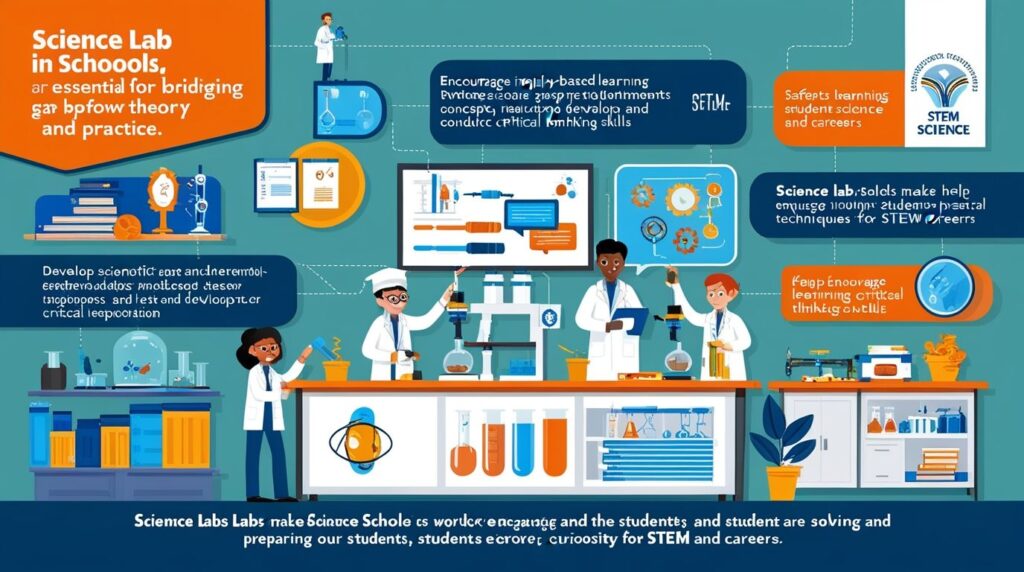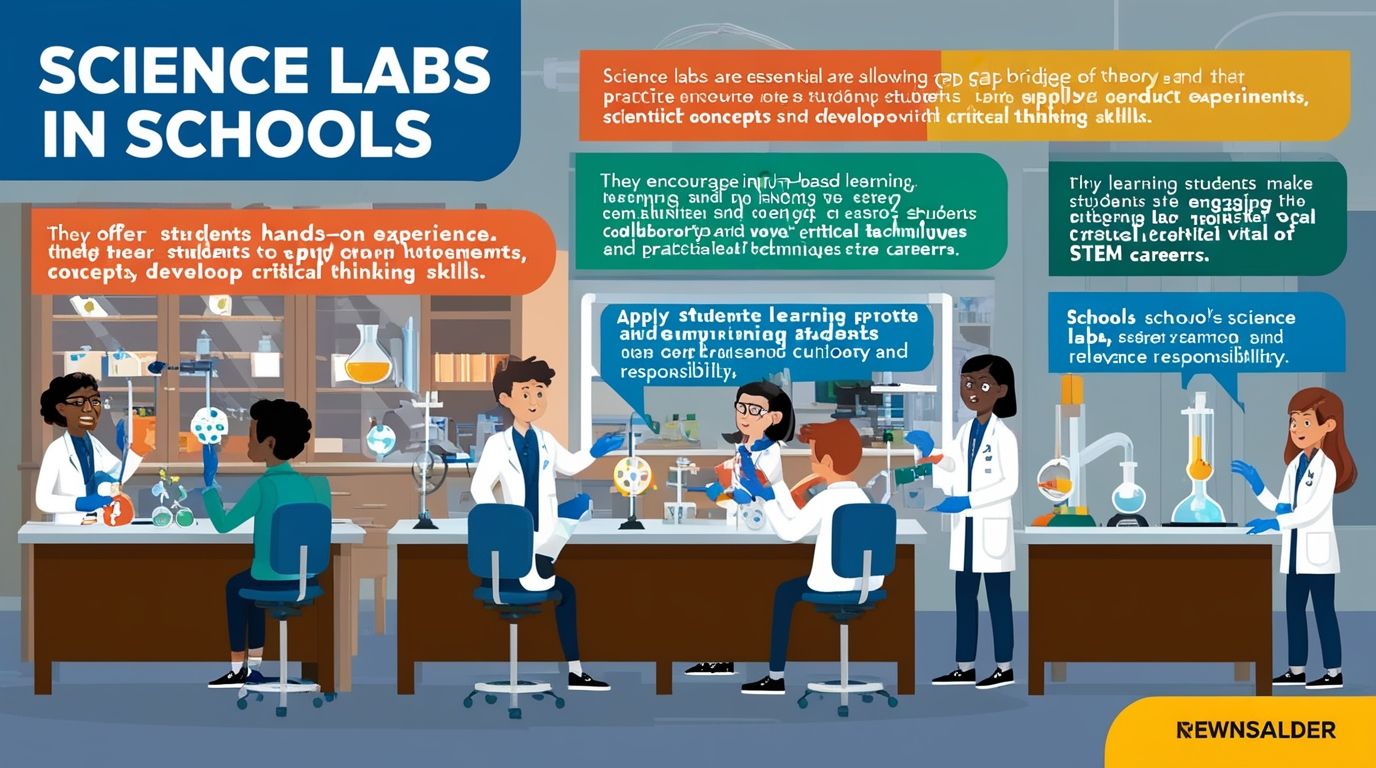The Importance of Science Labs in Schools, Science is one of the most important subjects taught in schools, as it fosters curiosity, critical thinking, and an understanding of the world around us. Science laboratories in schools play a pivotal role in delivering science education effectively. They provide a practical, hands-on learning experience that allows students to understand and apply theoretical knowledge, observe scientific phenomena, and develop essential skills. This article explores the many reasons why science labs are indispensable in schools, emphasizing their contribution to a well-rounded science education.
1. Enhancing Theoretical Understanding
One of the primary purposes of science labs is to bridge the gap between theory and practice. In traditional classroom settings, students learn scientific principles, theories, and concepts from textbooks or lectures. However, simply reading about the laws of physics, the structure of atoms, or chemical reactions often leaves students with an abstract understanding. Practical experience is essential to solidify these concepts.
Science labs allow students to directly apply what they have learned in class by conducting experiments, testing hypotheses, and observing outcomes. For instance, while learning about chemical reactions, students may read about exothermic and endothermic reactions, but it is through practical demonstrations in a lab that they can observe the heat change during these reactions, leading to a deeper and more intuitive understanding of the concept.
2. Promoting Inquiry-Based Learning
Science is driven by inquiry, curiosity, and the need to understand natural phenomena. Science labs foster an environment where students can ask questions, formulate hypotheses, and experiment to find answers. This approach, known as inquiry-based learning, encourages students to think critically, analyze data, and draw conclusions based on evidence.
By actively engaging in the scientific process, students become more invested in their learning. They can test their ideas, learn from their mistakes, and refine their understanding of scientific principles. For example, a student experimenting with Newton’s laws of motion in a lab can manipulate variables like mass or force and see how these changes affect the motion of objects, promoting a deeper, firsthand understanding of the subject matter.
3. Developing Critical Thinking and Problem-Solving Skills
Science education is not just about acquiring knowledge; it is also about cultivating essential skills like critical thinking and problem-solving. Science labs are perfect settings for students to develop these skills. In the lab, students must often navigate complex experiments, solve unexpected problems, and analyze data to interpret results.
For instance, if an experiment does not go as planned, students must troubleshoot by identifying errors, adjusting their approach, and trying again. This process teaches resilience and the importance of persistence. Furthermore, interpreting the results of experiments involves logical thinking and analytical skills, as students must consider whether their results support their initial hypothesis and what variables might have influenced the outcome.
4. Encouraging Collaborative Learning
Science is often a collaborative endeavor, and science labs in schools provide an excellent opportunity for students to work together. Collaborative learning in labs encourages teamwork, communication, and cooperation. Students often work in pairs or groups to conduct experiments, share ideas, and discuss their findings.
This collaboration not only enhances their learning experience but also prepares them for future careers where teamwork is essential. By working together, students can learn from one another’s strengths, develop interpersonal skills, and tackle scientific challenges collectively. Moreover, it promotes a sense of shared responsibility, as each member of the group plays a role in the success of the experiment.
5. Building Practical Skills and Scientific Techniques
In addition to theoretical knowledge, science labs help students acquire practical skills that are crucial for any aspiring scientist. These skills include handling scientific instruments, measuring quantities accurately, recording observations, and analyzing data. For example, students learn how to use microscopes, pipettes, Bunsen burners, and other laboratory equipment.
These hands-on skills are valuable not only in scientific fields but also in everyday life. Science labs teach students to be precise, detail-oriented, and careful in their work. Moreover, these practical experiences make science tangible, transforming abstract concepts into real-world applications. Students who develop these skills in school laboratories are better prepared for advanced scientific study and careers in research, medicine, engineering, and other STEM-related fields.
6. Making Science Engaging and Fun
Science labs make learning exciting and engaging. While lectures and textbook learning can sometimes feel dry or disconnected from real life, labs provide dynamic, interactive experiences that capture students’ interest. The thrill of conducting an experiment, seeing a chemical reaction unfold, or discovering something new makes science come alive in the lab.
For many students, these hands-on experiences are what spark a lifelong interest in science. Whether it’s watching a volcano model erupt in a chemistry experiment or exploring biological cells under a microscope, these moments can inspire curiosity and wonder. As a result, students are more motivated to learn, and science becomes a subject they look forward to rather than a set of abstract concepts to memorize.
7. Preparing Students for Future Scientific Careers
Science labs in schools serve as a stepping stone for students who wish to pursue careers in science, technology, engineering, or medicine (STEM). Many of the skills and techniques students learn in the lab are directly transferable to professional scientific work. Moreover, early exposure to lab work helps students understand the nature of scientific inquiry, the importance of precision, and the role of experimentation in advancing knowledge.
For students interested in careers in research, medicine, or engineering, hands-on experience in science labs provides them with a foundation for future academic and professional success. By familiarizing students with laboratory environments and procedures, schools can help prepare the next generation of scientists, doctors, and innovators.

8. Fostering Environmental and Social Awareness
Science education plays a key role in raising awareness about environmental and social issues, and science labs provide the ideal setting for students to explore these topics. By conducting experiments related to environmental science, biology, or chemistry, students can learn about the impact of human activities on the planet and explore solutions to global challenges such as climate change, pollution, and conservation.
For instance, students may conduct experiments on water purification, renewable energy sources, or the effects of pollutants on ecosystems. These lab activities help students understand the interconnectedness of science, society, and the environment, fostering a sense of responsibility toward the world around them.
9. Promoting Safety and Responsibility
Another critical aspect of science labs is teaching students the importance of safety and responsibility. Working in a lab requires strict adherence to safety protocols, including the proper handling of chemicals, the use of protective gear, and the correct disposal of waste. By following these protocols, students learn the importance of safety in scientific work.
In addition, lab work teaches students to take responsibility for their experiments, equipment, and results. Whether it’s cleaning up after an experiment, properly storing materials, or ensuring accurate data collection, students develop a sense of accountability for their work.
10. Supporting Diverse Learning Styles
Students learn in different ways, and science labs accommodate diverse learning styles by offering multiple avenues for understanding scientific concepts. For visual learners, labs provide a chance to see experiments and reactions unfold. Kinesthetic learners benefit from hands-on manipulation of equipment and materials, while auditory learners can engage in discussions with peers and instructors during the lab process.
This diversity of learning experiences ensures that all students have the opportunity to grasp scientific concepts in a way that suits their individual needs. By engaging multiple senses and learning modalities, science labs make science education more inclusive and effective.
Conclusion
Science laboratories are an essential component of science education in schools. They provide a dynamic and interactive environment where students can enhance their theoretical understanding, develop critical thinking and problem-solving skills, and acquire practical experience. Beyond the academic benefits, science labs make learning engaging, encourage collaboration, and prepare students for future careers in STEM fields. Moreover, they foster a sense of environmental and social responsibility, teaching students to be careful and conscientious in their work. In short, science labs play a crucial role in shaping well-rounded, scientifically literate individuals capable of addressing the challenges of the future.
References:
- National Research Council. (2006). America’s Lab Report: Investigations in High School Science. The National Academies Press.
- Singer, S. R., Hilton, M. L., & Schweingruber, H. A. (2005). How Students Learn: Science in the Classroom. The National Academies Press.
- Hofstein, A., & Lunetta, V. N. (2004). The Laboratory in Science Education: Foundations for the Twenty-First Century. Science Education, 88(1), 28-54.
- Millar, R. (2004). The Role of Practical Work in the Teaching and Learning of Science. Research Report, University of York.

8 thoughts on “The Importance of Science Labs in Schools”
Comments are closed.